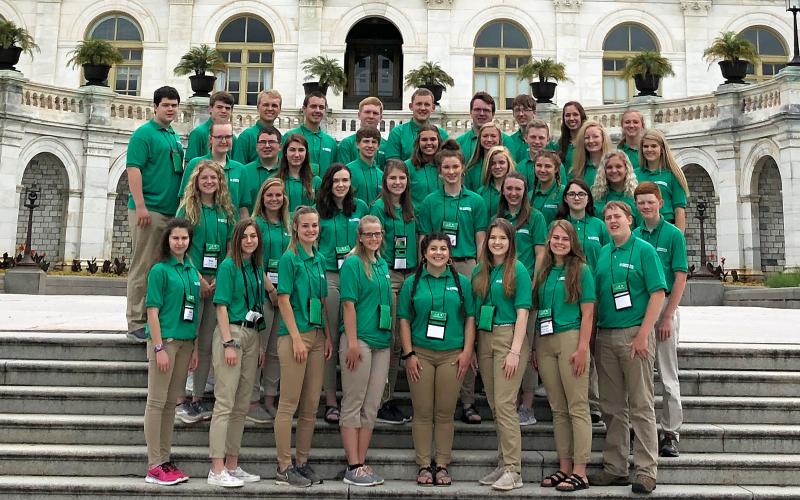Definitions and General Provisions
- Grievance – is defined as an alleged misinterpretation, misapplication or violation of a specific term or provision of 4-H policies affecting the rights or privileges of an individual provided by law.
- It is the responsibility of youth members to know their rights including the opportunity to grieve. This policy is not applicable to challenge a judges’ integrity, decisions, placements, or other evaluations absent a rule violation.
- No offer of settlement of a grievance by either party shall be admissible as evidence in later grievance proceedings or elsewhere. No settlement of a grievance shall constitute a binding precedent in the settlement of similar grievances.
- Failure to grieve to the next step within the specified time shall end the right to grieve. However, the parties to any grievance may, by mutual agreement, waive the time limits provided herein. Such extensions shall be in writing and approved by all parties with copies of the extension provided to all parties.
- For high profile events, expedited grievance components or procedures may be used at the discretion of the SDSU Extension State 4-H Program Director. These are often published in advance (e.g., State Fair booklet).
- The Board of Regents and Board administration, University Administration, SDSU Extension Administration, State 4-H Youth Development Program Office, local decision makers, or employees shall not retaliate or effect reprisals against any individual for rightful processing or participation in a grievance.
Grievance Procedure
The 4-H local decision entity in charge—often the local 4-H professional or a designated county/state committee—is responsible for initial rule/policy interpretations and decisions. When a rule/policy interpretation or decision is believed to be errant, a 4-H youth member (sometimes co-signed by at least one guardian for younger youth) may choose to initiate a grievance proceeding. Guardians or other adults are not eligible to initiate a grievance proceeding.
Step Zero: Civil Conversation to Local Decision Entity
In cases of simple errors, a conversation can be highly effective. Aggrieved youth are recommended to address the local decision entity in a civil and private manner as soon as the error is discovered. A guardian or other designated adult may be present but may not initiate this conversation. If this does not resolve the situation, aggrieved youth may choose to proceed onto the next step and initiate the formal grievance process.
Step One: Written Protest or Grievance to Local Decision Entity
The youth protesting or grieving a process or initial local determination shall file a formal written statement of grievance or protest to the initial decision maker. The statement must be filed no more than fourteen (14) calendar days after the initial local determination, action or non-action. The written statement may be handwritten or typed but must be legible.
The written statement shall contain the following information, at a minimum:
- The date of the incident
- A complete statement of all relevant known facts
- List of names, addresses, and, if available, telephone numbers of people involved
- Any rules, regulations, policies and/or procedures allegedly violated or misapplied
- A proposed resolution
- Name(s) and signature(s) of the individual(s) filing the protest or grievance
The initial decision maker will allow the interested parties an opportunity to provide information (when needed), analyze the facts and provide a written response to the parties within seven (7) calendar days.
If the aggrieved party fails to receive a response within that time limit or is dissatisfied with the finding, the individual has seven (7) calendar days to proceed to Step Two.
Step Two: Appeal to the State 4-H Program Director
A youth may grieve the Step One decision to the SDSU Extension State 4-H Program Director. The grievance should include copies of the original grievance and decision maker’s response (if a response was given).
When appropriate, the administrator will review facts from the interested parties through an appointed grievance committee.
The appointed grievance committee will be comprised of one representative from each of the programming committees, similar in nature to the situation involved with the grievance.
- Livestock: Beef, Sheep, Swine, Dairy, Poultry, Rabbit, Meat Goat and Companion Animal
- Youth In Action: Special Foods, Fashion Revue, Public Presentation, Horticulture Judging, Consumer Decision Making, Robotics
The grievance committee will NOT include representation from the entity involved at local determination, as they have already provided their justification for the decision; nor will it include representation from individuals who may possess a conflict of interest.
Committee composition will be comprised equally of volunteers and extension staff
- In even numbered years, the following committees will provide a volunteer:
- Livestock: Beef, Swine, Poultry, Meat Goat
- Youth in Action: Special Foods, Public Presentation, Consumer Decision Making
- In even numbered years, the following committees will provide a 4-H staff member:
- Livestock: Sheep, Dairy, Rabbit, Companion Animal
- Youth in Action: Fashion Revue, Horticulture, Robotics
- In odd numbered years, the opposite applies.
The Committee will complete their assessment within ten (10) calendar days, having:
- reviewed the written grievance documents filed by the individual
- at their discretion, conducted additional inquiry to further aid understanding (e.g., interviews, policy review)
- provided a recommendation to the State 4-H Program Director
The State 4-H Program Director will then issue a written response within four (4) calendar days following receipt of the committee’s recommendation.
The decision shall be provided to the aggrieved party, local decision entity, and pertinent personnel.
If the aggrieved party fails to receive a response within that time limit or is dissatisfied with the finding, the individual has seven (7) calendar days to proceed to Step Three.
Step Three: Appeal to the Director of the SDSU Extension
A youth may grieve the Step Two decision to the Director of SDSU Extension.
The grievance should include copies of the original grievance, local decision entity’s response (generated in Step One) and the State 4-H Program Director’s response (generated in Step Two).
The Director will investigate the matter either personally or through an appointed designee and will provide a written decision in response to the grievance. The decision shall include a statement of findings and conclusions supporting the decision.
This written response will be delivered within fourteen (14) calendar days of the date the grievance was received by the Director.
The decision shall be provided to the aggrieved party, local decision entity, pertinent personnel, and State 4-H Program Director.
If the aggrieved party fails to receive a response within that time limit or is dissatisfied with the finding, the individual has seven (7) calendar days to proceed to Step Four.
Step Four: Appeal to the Dean, College of Agriculture, Food and Environmental Sciences
A youth may grieve the Step Three decision to the Dean of the College (CAFES).
The grievance will include copies of the original grievance and the responses received in Steps 1-3.
The Dean will investigate the matter either personally or through an appointed designee and will provide a written decision in response to the grievance. This decision shall include a statement of findings and conclusions supporting the decision and will be considered final.
This written response will be delivered within fourteen (14) calendar days of the date the grievance was received by the Dean.
A copy of the decision shall be provided to the grievant, local decision entity, pertinent personnel, State 4-H Program Director, SDSU Extension Director, University President and SDSU General Counsel.
The SDBOR reserves the right to hear appeals of final decisions of the President, or designee, in accordance with SDBOR Policy 1:6 § 5.1.2.2.


